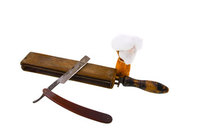It would take the troop ship I was on 30 days to reach Korea. I used to shave in the head, which was located in the prow of the ship. When the waves caused the ship to sink its prow under the water, the urinal would slosh from one end to the next. Standing at a washbasin with my thighs locked to its sides was a bit of challenge. I was shaving with what is called a ‘cutthroat razor.’ Mine, which I had for many years, had been stripped to the point of offering a reverse curve on the edge of the very sharp blade. So sharp, in fact, that I could cut into a hair and then slice along its center until, quartering it, I caused it to break.
The bulkheads between compartments had doors with round tops and bottoms that closed watertight. My performance shaving with this weapon of violence attracted an audience of attentive heads lining the doorway. So shocked was I that, when looking up to see this design of open-mouthed faces, I turned too quickly and slid the blade through the bottom of my ear, leaving a fine line of blood around the lobe. I didn’t so much as wipe it and it was closed and healed by bedtime.
When I boarded the ship, we were asked if we had any weapons to check. I told the officer about my shaving razor, which he asked me to turn into the supply locker until I left the ship. I asked him what time they opened the locker. He said, “Eight o-clock.” “That’s fine,” I said, “as long as you open it at six to let me use it to shave.” I got my razor back and that was the end of that. My brother, Leonard, fancied he would like to shave with a cutthroat razor and I got him one. Not long after, he presented his fine German blade to me, not being comfortable dragging it across his tender flesh first thing in the morning. I still trim my beard with that same razor.
Before we arrived, the United States, the People’s Republic of China, North Korea and South Korea agreed to an armistice, bringing the Korean War to an end. I was reassigned to Japan.



